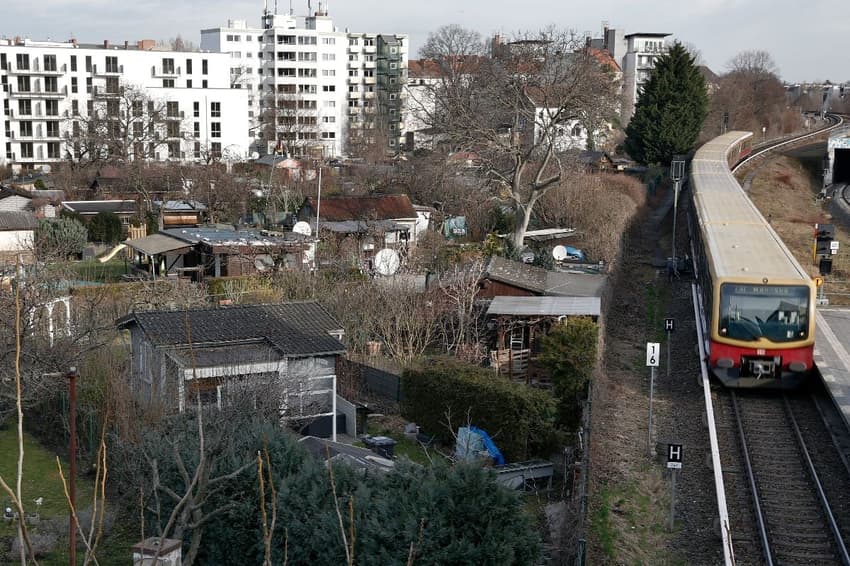Living in Germany: Rent control struggles, Spreewald mail and Kleingarten culture

This week we get into the positives and negatives of Germany's rent control law, the boat postal delivery service in Spreewald, summer weather and Kleingarten culture in Germany.
Living in Germany is our weekly look at some of the news and talking points in Germany that you might not have heard about. Members can receive it directly to their inbox on Saturday.
Germany’s rent controls extended - but are they good enough?
There was good news this week for tenants’ rights after the rental price brake or Mietpreisbremse was extended until 2029. The law, which applies in areas with dense housing markets including Berlin and Hamburg, prevents landlords from setting rents at rates deemed too high or unreasonable. The law says that the base rent (also known as ‘cold rent’ in Germany) cannot be set at more than 10 percent above the average rent for comparable flats in the same neighbourhood, while annual rent increases also can’t go unchecked.
Although rent controls are a welcome move for tenants struggling to find affordable housing, there are glaring problems. For instance, not every flat is covered by rent controls, including new-builds. Meanwhile, arguably the biggest problem is that many landlords don’t stick to the rules, meaning the burden lies with tenants to challenge landlords, which can be a difficult prospect when you feel lucky to have a roof over your head. Daniel Halmer, the CEO of Conny - a firm that helps tenants with these legal challenges - told The Local that many landlords charge too much. “We see a violation rate of 75 percent in Berlin. And that's pretty consistent over the last seven years,” he said.
So how could politicians improve the controls? One way would be to implement sanctions or punishments on a landlord or housing company if they break the law. As Halmer said: “If you have a law that has no sanction in case of violation, don't be surprised when people break that law.” Meanwhile, some critics say the rent brake has failed. An article by the Economist published three years ago said that rents in Berlin shot up by almost 10 percent following the introduction of the rent brake, which suggests that landlords took the opportunity to raise rents before the law took effect. Another issue is that there is no legal rent brake in place for rental contracts in Germany with a so-called Indexmiete or index rent, which links rent hikes to inflation. This has become a particular problem in recent years as inflation has rocketed upwards.
Tweet of the week
This seems like a pretty cool job. We’d like to join Andrea Bunar on her rounds delivering mail to the residents in the Spreewald!
📮🛶 Postal delivery by boat: for 127 years, some households in the Spree Forest near Berlin have been receiving their post by barge during the warmer months.
For 13 years, postwoman Andrea Bunar has been delivering mail to 65 addresses, many with no direct road access. pic.twitter.com/VNOs5gIyEH
— German Embassy London (@GermanEmbassy) April 5, 2024
Where is this?

Photo: picture alliance/dpa/Sebastian Kahnert
Germany has seen stunning sunshine in the last few days, making it feel almost summer-like. This is the perfect time to check out Brühl’s Garden in Dresden where the tulips and other colourful flowers are in full bloom.
Did you know?
My parents recently visited Berlin from Scotland and they were surprised to see just how many allotments there are all over the city, from Neukölln to Pankow and beyond. Germany certainly has a culture of enjoying the outdoors and I feel that Kleingärten are a great example of this. The Kleingarten or Schrebergarten is a small plot of land that residents can lease to use as their own little garden to grow vegetables, flowers or simply to relax and have a picnic away from cramped apartment life.
There are over 900,000 throughout Germany and the Federal Association of German Garden Friends estimates that around five million people use a garden like this. It’s often surprising to see the large structures that people build in these allotments. Some of these garden homes look bigger than my flat. The only catch is that it takes a long time to get your hands on one of these coveted allotment spots. You can join a waiting list but it may be years until you’re offered one (if ever). It’s safe to say that once you have your hands on a Kleingarten, you’re probably never going to give it up.
Comments
See Also
Living in Germany is our weekly look at some of the news and talking points in Germany that you might not have heard about. Members can receive it directly to their inbox on Saturday.
Germany’s rent controls extended - but are they good enough?
There was good news this week for tenants’ rights after the rental price brake or Mietpreisbremse was extended until 2029. The law, which applies in areas with dense housing markets including Berlin and Hamburg, prevents landlords from setting rents at rates deemed too high or unreasonable. The law says that the base rent (also known as ‘cold rent’ in Germany) cannot be set at more than 10 percent above the average rent for comparable flats in the same neighbourhood, while annual rent increases also can’t go unchecked.
Although rent controls are a welcome move for tenants struggling to find affordable housing, there are glaring problems. For instance, not every flat is covered by rent controls, including new-builds. Meanwhile, arguably the biggest problem is that many landlords don’t stick to the rules, meaning the burden lies with tenants to challenge landlords, which can be a difficult prospect when you feel lucky to have a roof over your head. Daniel Halmer, the CEO of Conny - a firm that helps tenants with these legal challenges - told The Local that many landlords charge too much. “We see a violation rate of 75 percent in Berlin. And that's pretty consistent over the last seven years,” he said.
So how could politicians improve the controls? One way would be to implement sanctions or punishments on a landlord or housing company if they break the law. As Halmer said: “If you have a law that has no sanction in case of violation, don't be surprised when people break that law.” Meanwhile, some critics say the rent brake has failed. An article by the Economist published three years ago said that rents in Berlin shot up by almost 10 percent following the introduction of the rent brake, which suggests that landlords took the opportunity to raise rents before the law took effect. Another issue is that there is no legal rent brake in place for rental contracts in Germany with a so-called Indexmiete or index rent, which links rent hikes to inflation. This has become a particular problem in recent years as inflation has rocketed upwards.
Tweet of the week
This seems like a pretty cool job. We’d like to join Andrea Bunar on her rounds delivering mail to the residents in the Spreewald!
📮🛶 Postal delivery by boat: for 127 years, some households in the Spree Forest near Berlin have been receiving their post by barge during the warmer months.
— German Embassy London (@GermanEmbassy) April 5, 2024
For 13 years, postwoman Andrea Bunar has been delivering mail to 65 addresses, many with no direct road access. pic.twitter.com/VNOs5gIyEH
Where is this?

Germany has seen stunning sunshine in the last few days, making it feel almost summer-like. This is the perfect time to check out Brühl’s Garden in Dresden where the tulips and other colourful flowers are in full bloom.
Did you know?
My parents recently visited Berlin from Scotland and they were surprised to see just how many allotments there are all over the city, from Neukölln to Pankow and beyond. Germany certainly has a culture of enjoying the outdoors and I feel that Kleingärten are a great example of this. The Kleingarten or Schrebergarten is a small plot of land that residents can lease to use as their own little garden to grow vegetables, flowers or simply to relax and have a picnic away from cramped apartment life.
There are over 900,000 throughout Germany and the Federal Association of German Garden Friends estimates that around five million people use a garden like this. It’s often surprising to see the large structures that people build in these allotments. Some of these garden homes look bigger than my flat. The only catch is that it takes a long time to get your hands on one of these coveted allotment spots. You can join a waiting list but it may be years until you’re offered one (if ever). It’s safe to say that once you have your hands on a Kleingarten, you’re probably never going to give it up.
Join the conversation in our comments section below. Share your own views and experience and if you have a question or suggestion for our journalists then email us at [email protected].
Please keep comments civil, constructive and on topic – and make sure to read our terms of use before getting involved.
Please log in here to leave a comment.